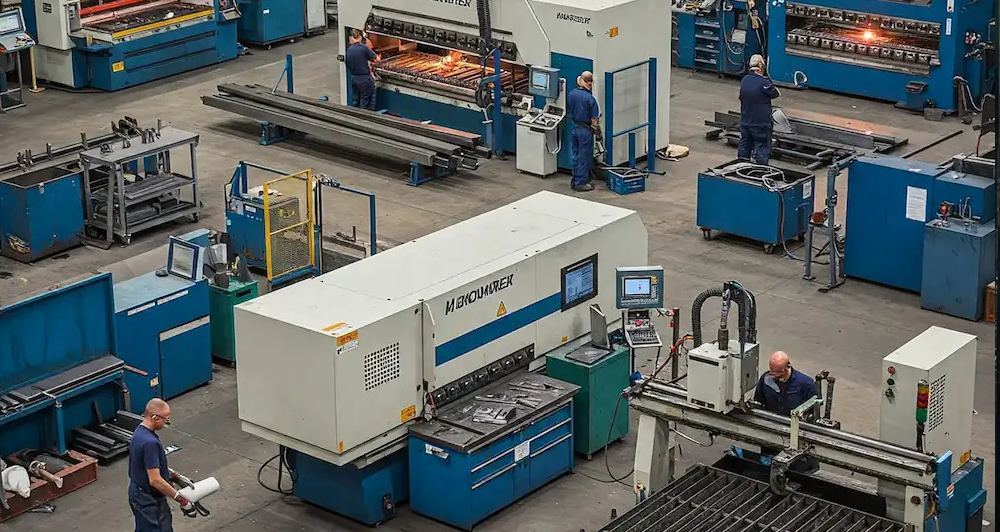How to Compare Metal Fabrication Suppliers and What to Look For

By Melissa Brooks
Published on: 7/24/2025

Picking a metal fabrication supplier can feel like choosing a teammate for a big game, you want someone reliable, skilled, and ready to deliver when it counts. I’ve been navigating this world for over a decade, sourcing everything from brackets to beams, and I’ve learned the hard way what separates the champs from the chumps. This post is your playbook for comparing suppliers, key stuff to watch for, red flags to dodge, and tips to land the right one. Whether you’re building cars or cranes, let’s figure out how to pick a winner.
Table of Contents
- Table of Contents
- Why Comparing Suppliers Matters
- Experience and Industry Expertise
- Capabilities and Equipment
- Quality Standards and Certifications
- Material Sourcing and Availability
- Production Capacity and Lead Times
- Cost and Pricing Transparency
- Customer Service and Communication
- Flexibility and Customization Options
- Location and Logistics
- Reputation and References
- Conclusion
Why Comparing Suppliers Matters
Not all fab shops are created equal. A good one saves you cash, time, and headaches; a bad one can cause delays, junk parts, and a chewed-out ear from the boss. I’ve been there. Comparing suppliers isn’t just about price, it’s about quality, speed, and fit for your job. I once rushed a pick and got burned with late deliveries; now I dig deeper. Getting it right keeps your project humming and your sanity intact.
Experience and Industry Expertise
Start with their track record. How long have they been at it? A shop with decades, like AMG Industries, knows the ropes. Industry chops matter too, automotive needs tight tolerances; construction wants beefy builds. I’ve worked with a newbie once that had a great price, but they botched a weld spec. Go for experience that matches your product; it’s the foundation of trust.
Capabilities and Equipment
What can they do? Check out their capabilities; modern presses, laser cutting, and CNC bending mean precision and speed. Can they stamp, weld, cut? Do they operate with small runs or big batches? A supplier once couldn’t handle my volume causing two weeks of lost time.
Quality Standards and Certifications
Quality is your lifeline. Look for certifications. Do they have testing capability? Quality testing like gauges or stress checks catches flaws. Samples are a must to catch an issue before a run goes south. Ask how they handle rejects. A good shop owns it and fixes it fast. No certifications, no testing? Your parts won’t hold up.
Material Sourcing and Availability
Metal is the raw deal. Where is it from? Reliable suppliers stock steel, aluminum, or whatever you need and know their sources. Shortages kill schedules. I’ve waited a month for stainless once because a shop didn’t plan. Can they get specialty materials fast? A pro once sourced galvanized steel overnight and saved my bacon. Dig into their supply chain. Shaky sourcing means shaky deliveries.
Production Capacity and Lead Times
Can they keep up? Ask about capacity, how many parts, how fast? Lead times are gold. I’ve padded schedules after a supplier lagged and still hit my deadline. Rush jobs cost more, so know their flex. A shop once promised quick turn but choked on volume. Match their pace to your clock to ensure a successful supply chain.
Cost and Pricing Transparency
Let’s talk cash. Cheapest isn’t best. Low bids often hide sloppy work. Get breakdowns of tooling, materials, and labor so you’re not blindsided. I’ve negotiated big runs to drop per-part costs and saved 15%. Ask about extras fees such as shipping, packaging, and expedite fees. Clear pricing keeps your budget on track.
Customer Service and Communication
Good service is gold. Are they quick to reply? I’ve ditched shops that ghosted me mid-order. Do they update you regularly with good or bad news? Face-to-face time matters too. Pick a team that talks not one that leaves you guessing.
Flexibility and Customization Options
Jobs shift often; can they roll with it? Custom fab is key. Welded assemblies or odd shapes need tweaking. I’ve had specs change mid-run. A good shop can pivot. Will they run small batches or prototypes? Some won’t bother, but I’ve found ones that do. Flexibility is a lifesaver when plans go sideways.
Location and Logistics
Where they are at counts. Local is fast with less shipping hassle, but far-off might save cash if they’re top-notch. Ask about delivery, reliable trucking, or sketchy carriers? Weigh distance against speed and cost.
Reputation and References
What’s the word on the street? Check reviews, ask around, ask for referrals. Reputation is earned and is hard to fake.
Conclusion
Comparing metal fab suppliers isn’t just shopping, it’s strategy. Dig into their skills, equipment, quality, and reputation to help land a partner that nails your job. Need a supplier that checks the boxes? AMG Industries has the goods. Give us a call and let’s get your project rolling!

About the author
Melissa Brooks
Melissa Brooks, Account Manager at AMG Industries, brings over 20 years of experience to her blog posts on precision metal manufacturing. With a background in sales and human resources at companies like ArtiFlex Manufacturing, where she managed major accounts like Ford Motor Company and drove record-breaking sales, she knows the industry inside out. She shares actionable advice on cutting costs, improving quality, and streamlining procurement—covering everything from sheet metal fabrication to metal stamping benefits.
